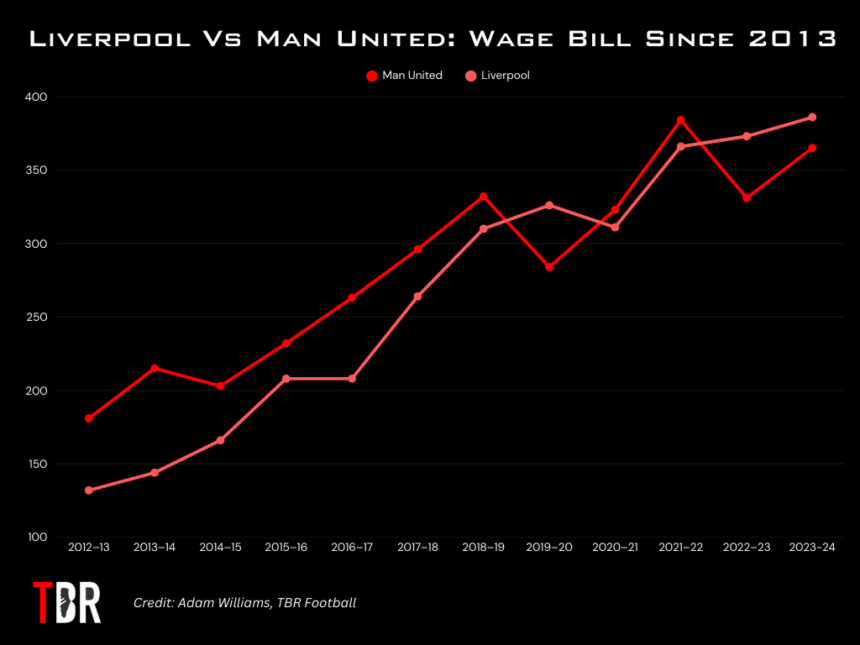The split between Liverpool and Manchester United since Ed Woodward proclaimed that the Red Devils don’t need to win trophies to be commercially successful has been stark.
The former Old Trafford vice-chairman was speaking in 2013, when Man United had just won their 20th league title, while Liverpool were stuck on 18 and without one in the Premier League.
Football – and particularly football finance – was very different back then. With no Financial Fair Play (FFP), which was later rechristened Profit and Sustainability Rules (PSR), it was the Wild West.
Manchester City, who had won their first Premier League title in 2012, were about to change everything. The first nation state-backed club inflated both the wage and transfer market almost overnight. At the same time, global capital was getting its teeth stuck into the beautiful game.
It was football’s Big Bang moment – and it hasn’t stopped expanding since.
Credit: Adam Williams/TBR Football/GRV Media
Liverpool and Man United have navigated the revolution in very, very different ways.
Fenway Sports Group (FSG) have been a case study in how to balance success and sustainability. At times, Liverpool fans have been frustrated with their apparent lack of risk appetite, but the trophy haul in an era dominated by a generational Manchester City side with limitless resources speaks for itself.
One can question the motivations of John Henry, Tom Werner and Mike Gordon on Merseyside, the European Super League being case in point. They are, however, fundamentally competent.
United, by contrast, have been utterly feckless. They have lurched from manager to manager, from win-now types like Jose Mourinho to the trendy-but-useless Erik ten Hag and everything in between. Their spending has been, to put it charitably, mind-meltingly profligate.
The Glazers have been absentee landlords, content to see the club drown in a rising tide of debt while squandering the club’s enormous commercial revenues on retail therapy in the transfer market to almost no avail.
The American owners have turned wine into water, written their own riches-to-rags story in Manchester.
Financially, the situation is approaching critical mass. United have lost £360m in the last five years and are 18 months out from being forced to refinance over £500m worth of their debt, probably at double the current annual interest rate.
Credit: Adam Williams/TBR Football/GRV Media
That is the situation that Sir Jim Ratcliffe has inherited, though the Oldham-born billionaire’s penny-wise, pound-foolish approach has hardly endeared himself to the United fans he claimed to represent following his part-takeover in February last year.
There are any number of antagonists in this tragicomedy – a horse named the Rock of Gibraltar, Malcolm Glazer, umpteen overpaid superstars, for example.
But for many, Ed Woodward is the real arch-villain of the last 12 years.
Liverpool must avoid Ed Woodward mentality, says football finance expert
With a second Premier League title in the FSG era sewn up, the word ‘dynasty’ has cropped up in more than a few op-eds and social media posts.
But unless you have the resources of Man City, is it even possible for Liverpool to build a 1970s and 80s-style dynasty on the pitch under FSG’s self-sufficient business model?
Credit: Adam Williams/TBR Football/GRV Media
“In terms of returning Liverpool to the dynasty they have had in previous eras, I think it is desirable rather than essential as far as FSG are concerned,” says University of Liverpool football finance lecturer Kieran Maguire, speaking exclusively TBR Football.
“They acknowledge that they are in a competitive market. They acknowledge that there are other owners who have greater resources than them. What they want to do is be competitive. But more than ever before, Champions League participation is their ultimate aim.
“When they didn’t qualify for the Champions League, we saw the impact that had on revenues. There is a symbiotic relationship between revenues and success, of course.
Credit: Adam Williams / GRV Media
“Winning trophies activates bonuses and gets more people on the phone with you wanting to do a partnership. The general feeling around the club and the city also contribute to merchandise sales.
“Given that FSG don’t live in Liverpool, I don’t know how much they see that, but commercial has doubled since 2018, from £154m to £308m – that is superb.
“They will be wary of what has happened at Man United with Ed Woodward’s comments about not needing trophies to be successful commercially, however.
“What has happened there? United’s commercial growth has flatlined. It has been disastrous.
Liverpool’s commercial plan to win more Premier League titles
Speaking in the wake of Arne Slot’s Premier League triumph, Liverpool’s chief commercial officer Ben Latty explained the impact his department has on the football side of the club.
“To sustainably finance the pursuit of trophies,” said Latty when asked to outline the main responsibility of the commercial department.
“We’re already looking to the future and working out how we can best maximise this success [winning the Premier League] to continue our commercial growth and support further on-pitch success.”
Mohamed Salah’s selfie celebration against Tottenham on the day Liverpool were crowned champions – a marketing stunt for club sponsor Google Pixel – was emblematic of how the two sides of the club are now inseparable.
